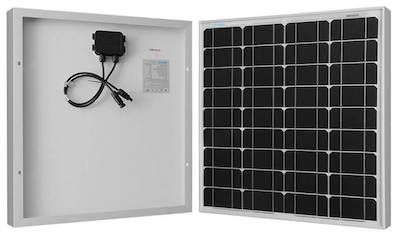When we talk about solar energy, we refer to one of the cleanest sources of electric power in the world. You will conveniently harness this kind of energy from the natural sunlight.
From technical analysis data and estimations, we know that in 24 hours, the sun is capable of generating energy that can sustain the population of the world for about 27 years! Amazing huh?!
That’s the reality; however, we have not put up infrastructure to enable us to capture lots of this energy.
Types of Solar Panels
We can classify solar panels in four primary categories, including concentrated PV Cell panels which have a high efficiency of around 41%. This type of solar panels is commonly used in large scale generating stations. Other categories of solar panels available in the market include monocrystalline solar panels which usually have an efficiency of about 20 %, Polycrystalline Solar panels that often achieve an efficiency rate of about 15 % and thin-film solar panels that are rarely more than 10% efficient.
Which of These Can You Use As Camping Solar Panels?
When choosing a panel for camping, you will consider flexibility and portability. With that in mind, you will select the thin film type or the monocrystalline type. Be as it may, due to the lower efficiency of the thin-film solar panels, the monocrystalline panels are attracting more preference.
Nonetheless, your ultimate choice of camping solar panels will depend on the power requirements you have, your budget and other apparatus you have to use in your panel kits.
If you have to store the energy generated from your solar kits; you can use batteries that you can either charge continuously or intermittently subject to your load demands and capacity of the panels vis-à-vis the current drawing requirements of your accumulators. In this case, automatic battery float chargers that have a floating circuit that maintains full charge of batteries without overcharging them are desirable. Furthermore, you will need an inverter to convert power to AC, thus enabling you to use regular appliances.
For you to achieve higher exploits of your solar system, preventive maintenance is vital. You should always maintain the level of the electrolyte in your batteries and keep the terminals clean. Moreover, you have to ensure that your batteries’ terminal clips are well tightened to prevent unnecessary arcing. Also, ensure that your cells do not get wholly drained because this will mean longer charging periods and high current output from your solar panels. Alternatively, you can omit batteries if the weather conditions are favourable; but to safeguard your appliances against excessive voltages, always power them through a charge controller.
Camping Solar Panels Outlook
Solar panels are commonplace items. Nevertheless, camping solar panels are somewhat unique because their application is not widespread.
Camping solar panels are usually versatile and easy to use. For example, the Renogy 12Volt monocrystalline solar panel is available on Amazon Australia. It weighs less than seven kilograms hence easy to carry around. With 80 watts output capacity, it is well applicable in various camping situations, and you will not need to have a battery for you to use it.

On the back of this panel, you will find predrilled holes that will enable you to mount it easily. As fancy as it can be, it remains robust enough to withstand various environmental effects since its junction box is IP65 rated.
It has aluminium frames that are corrosion resistant and ideal for prolonged use in the field.
Final Word
Whether you will choose a foldable solar panel or a sturdy kit that you can permanently mount on top of your vehicle or boat, it is upon your preferences alongside your budget.

